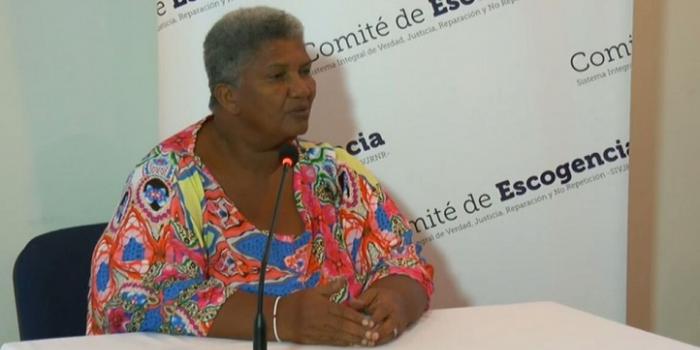
"To continue being Angela, the one who lives on foot who lives in the Barrio Obrero"
Words pronounced by María Ángela Salazar Murillo, when she was chosen by the selection committee to be part of the 11 members of the Commission for the Clarification of the Truth, Coexistence and Non-Repetition, today that same Barrio Obrero and a whole sub-region by those who led their struggles mourn their departure.

The municipality of Apartadó and an entire sub-region mourn its leader María Ángela Salazar Murillo, a standard bearer and recognized fighter for the rights of victims but who at 66 could not overcome the battle against COVID-19.
A woman who toured the country carrying the voice of those who did not have it, mother of 4 children, grandmother of a home that revived for more than 34 years, with a frank smile and sweet voice, to whom everyone listened: the ex-combatant, the young people in conflict and groups in contention, because she was able to catch up with those who generated discord, to try to understand and mediate through the remarkable wisdom of those who know how to listen without judging.
That was Angela Salazar, it was not uncommon to see her speaking in a corner of her beloved Obrero neighborhood, speaking with women, with children, with young people, with workers, or also already transformed into that tireless leader of honorable representation in the Commission for the Clarification of Truth, a delegation that she fulfilled with dignity until the last breath of her life.
Although in the country, some years ago, people began to hear about Ángela's legacy, already as Commissioner of Truth, this leader had been working on struggles and weaving stories of peace and reconciliation in different spaces and estates, such as in the Initiative of Women for Peace, the Reconciliation Table in Urabá, in the construction of historical memory in Antioquia and in initiatives that are based on peace and the defense of human rights.
"I think they named me because many people saw my work, since I began documenting cases, being there with the victims, they have seen that I can be reliable, I am the part of those who walk on foot".
That trust and respect that she managed to inspire in those who knew her, gave her the invaluable opportunity to mediate and facilitate reconciliation processes in a region even in the most difficult times in which the conflict raged and even raged on her.
In spite of everything, Angela was convinced that only through forgiveness would it be possible to change the course of history; there was no space in which she did not emphasize it.
When I forgive, I open the door to reconciliation; forgiveness is individual, it is not collective, it is my forgiveness, it is a way of saying this happened to me, it did not happen to everyone, I don't have to continue living in that memory of what happened to me”.
Angela represented the woman, whom everyone wanted to hug, with a warm voice and slow speech, which reflected in all settings, even those of debate, her wise and matronal aspect in the sense of wanting to accompany women in this new giving to light, in that awakening in which she managed to empower them.
Ángela Salazar, a woman victim of displacement, was born in Tadó Chocó, at the age of nine, she arrived in Medellín where she lived a large part of his youth and graduated from high school in 2000. There she worked as a library assistant at Universidad Autonoma, and then, after losing her job, among other circumstances, she made the decision to settle in Urabá at the age of 26 years.
In her house her memories rest, she lived without pretensions. She, an intuitive, conciliatory survivor, without great academic degrees or interest in showing off, with technical cartoons that wallpaper part of the wall of her house, a reflection of her simplicity. Her children, grandchildren, those of the Obrero saw her as such, and in the street whoever she saw doing something improper she corrected him with love as if he were her son.
Today Angela says goodbye to this memorable day, which is no coincidence, as those who knew her say: "It does not seem a coincidence that Angela Salazar left this world on the day the Battle of Boyacá is commemorated, she says goodbye leaving us one last message, it was always a fighter. Rest in peace. ", said one of the people who were close to Angela.
This woman who even struggled with her own ailments and traces of the war left the most valuable legacy, love for her fellow men, credibility, granted by those who knew her, who encouraged her to be part of the history of peace in the country and a standard-bearer of justice and truth.
“The greatest meaning is that we of the common have some truths, suddenly more authentic, at least we have lived them and we have not had anyone to support us at any given moment; We had to ruminate on the pain alone, tell each other our truths, our cries or keep quiet so that our children would not notice, or because we had to go to work because life had to go on, because it was not me alone but other people who He was by my side, ”Angela said after being appointed in 2017 as a commissioner.
"Urabá loses a great leader and spokesperson for the region", assures Elizabeth Granada Ríos, director of the Urabá Darién territory.
(End/CYTS/EG)






